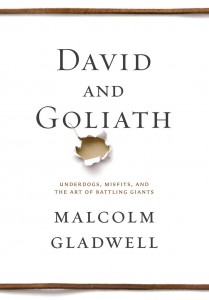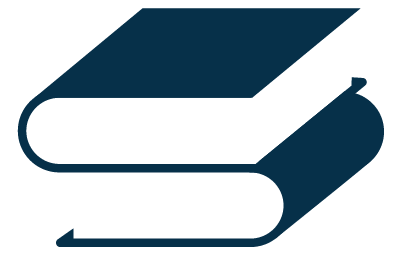 Nonfiction (Released October, 2013)
Nonfiction (Released October, 2013)
Bottom Line: Skip it.
Link to this book on Amazon
Plot Summary:
Gladwell investigates the phenomenon of underdogs and why they are so often able to topple the “giants”.
My Thoughts:
I loved Gladwell’s The Tipping Point (I didn’t love Blink or Outliers quite as much) and I have always been drawn to triumphant underdog stories, so I thought I would love his latest look at social phenomena. Unfortunately, David and Goliath just didn’t do it for me.
As always with Gladwell’s books, there were some fascinating examples of his overall theory, but the ratio of fascinating to boring examples was too heavy on the boring this time around. He used a mix of examples from present day and history to make his points. The present day ones were thought-provoking and I found myself telling people about them while I was reading this book, but I was bored to tears by the historical ones. And, it was a stretch that these situations clearly illustrated his points about the giants and underdogs.
Part 1 covers people’s tendency to misunderstand factors that are commonly thought of as “advantages”. I loved the examples he used here, particularly why extremely wealthy parents can have more problems successfully raising children and the “big fish/small pond” effect with college choices (i.e. students do better being a big fish in a smaller pond than a small fish in a big pond…choosing Harvard isn’t always the best option).
Part 2 covers the “theory of desirable disadvantages” – how certain disadvantages can actually have positive effects. Gladwell was more hit and miss on the examples in this section. I loved his study of the strangely high percentage of successful entrepreneurs who are dyslexic (i.e. Richard Branson, Brian Grazer, Charles Schwab) and the percentage of successful people who lost a parent when they were young (i.e. Wall Street’s Gary Cohn, ground breaking child leukemia doctor “Jay” Freireich, and over a quarter of U.S. Presidents). But, his examples of a dyslexic associate of MLK Jr.’s successes during the Civil Rights movement and the London citizens during the Blitz of WWII didn’t connect for me.
Part 3 covers the limits of power and is mostly devoted to the British Army’s actions to contain civil unrest in Ireland. This is where Gladwell completely lost me and I really wondered how the Ireland situation related to his overall theme…plus, I was SO bored and had trouble following this story. By this point, I was just ready for the book to be over.
There are some great nuggets in David and Goliath, but not enough to warrant reading the entire thing. You can probably get the good points through a Google search – plus, I’ve given them to you here!
You May Like:
Moneyball by Michael Lewis
The Presidents Club by Nancy Gibbs and Michael Duffy
